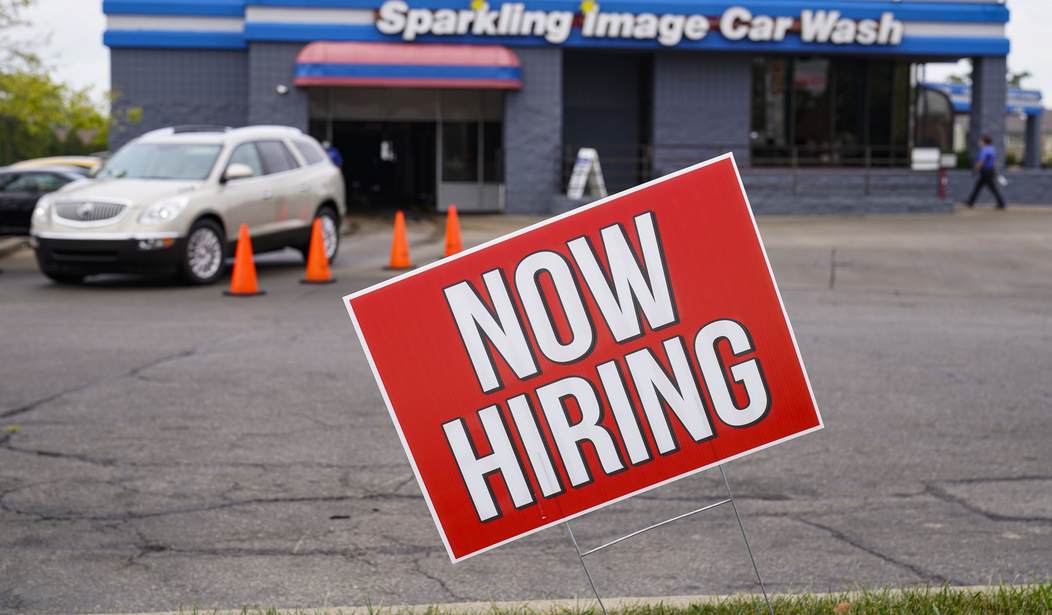For countless Americans, the summer and fall are not shaping up as they expected — and small business owners are no exception. Only 235,000 jobs were added to the economy in August, despite economists predicting up to 750,000. It was the worst jobs report since January.
The shortage of American workers continues to wreak havoc on the economic recovery. Employers cannot be expected to grow a business and create new jobs when they are struggling to fill the positions it takes to simply get through the day.
And it’s not just small businesses that are feeling the strain of the labor shortage. Recent surveys of senior executives from some of the largest U.S. companies reveal that labor shortages have been a much bigger barrier to the recovery than Democrats care to admit.
Among the survey feedback, one executive worried that despite record-high hiring blitzes, “turnover is high, and many former employees are still on extended unemployment or not ready to return to work.” Another lamented that it is becoming “increasingly difficult to find qualified candidates to fill open positions.”
There has never been a more important time to end federal pandemic programs that make it more lucrative for many Americans to stay home and collect government benefits, rather than return to work.
The $300 weekly federal unemployment bonus finally expired in September, but the Biden Administration will allow states to continue paying bonuses using money from other federal stimulus programs. Doing so would be a mistake. Twenty-six states ended the boosted federal benefits this summer, and those that did so experienced a noticeable uptick in work search, new hires, and lower unemployment as a result.
Recommended
Between late May and July, the number of people collecting unemployment dropped by roughly 60 percent in states that opted out of the federal unemployment bonus. States that continued paying the bonus saw only an eight percent decrease in individuals on unemployment.
The evidence is clear—to get people back to work, the government needs to stop paying them to stay home.
Yet, instead of removing these government-imposed barriers to work, Democrats are calling for more of the same failed policies that have sabotaged the recovery in the first place. Their latest demands include a proposal from the House Democrats to extend the massively expanded Child Tax Credit payments to 2025 (which are set to expire at the end of the year). This sets the stage for a later push to make the payments permanent.
They also include President Biden’s decision to increase food stamp benefits by 25 percent—the largest expansion of a welfare program since ObamaCare.
These programs were never meant to be long-term benefits to replace employment. We must remember that the federal government made radical changes to welfare programs during the pandemic months to mitigate the economic damage of the lockdowns imposed on millions of people. It was a problem they created, and in an attempt to solve it, they created a new welfare trap.
Now, Democrat-led efforts to incentivize Americans to rely on government, not gainful employment, to regain economic stability during the pandemic is like trying to escape a hole by giving everyone a shovel. It’s not going to work—and what’s more, it’s not what Americans want.
A recent poll from the Center for Excellence in Polling found that nearly two-thirds of Americans have directly felt the impact of worker shortages in their community, with unemployment bonuses seen as the top cause.
Sixty-eight percent of voters across all parties, including Democrats, are concerned with recent efforts to expand welfare programs in the United States. Now more than ever, Americans support the integral role of work in society, and the dignity that comes with having a job.
There were nearly 11 million open jobs heading into August, a record high, and far fewer Americans actively looking to fill them. Anyone who wants a job is in a strong position to find a job. The question is, does the Democratic Party want them to?

























Join the conversation as a VIP Member